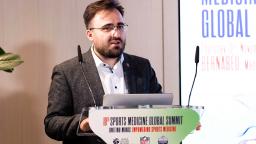Cari Roccaro: “Hey, I got brown hair and I have mental health therapy”
Cari Roccaro: “Hey, I got brown hair and I have mental health therapy”

- Cari Roccaro is a 27-year old midfielder for Angel City FC in the US National Women’s Soccer League
- Together with her friend Ginny McGowan she produces the podcast Butterfly Road to discuss athletes’ health and mental health issues
- Cari played a paramount role in NWSL players being entitled up to 6 months of mental health leave, which was included in their recent collective bargaining agreement.
I was the one who kind of got the ball rolling.
Heading into the 2019 season, I was asking the league for a leave to take care of my mental health. I assumed that anyone who was injured and was not able to be with their club, would still get paid and get all the benefits that come from being with a NWSL team. But I learned that I would not get paid and everything was going to be suspended until I was back competing with my team.
So I had to choose between my salary and livelihood, and my mental health. Weirdly it motivated me to speed up my recovery and I was ready for preseason …
I had to think about that, when a year ago Meghann Burke, the executive director of the NWSL Players Association, had a call with our team. I told Meghann that we should have something in place for when players need the time to leave, that they should have that opportunity while getting paid. Girls who tear their ACL are still getting paid, even though they are away from the team for months. Why treat a mental injury any different?
The union brought it to the negotiations. We’ve got up to 6 months of paid mental health leave and I think that is the first one in US sports’ history, which is so cool. It feels awesome that I have had such an impact. It makes me feel really special and proud.
But I only came up with the idea. Shout out to Meghann and all the girls on the negotiating team.
For the first time ever, you can have it all: an option to be safe and healthy, thrive and make money, and be part of the team.
I wonder how many players will come forward and be more open and vulnerable about their mental health instead of suffering in silence. This is opening the door to have a good conversation, to having coaches understand that you are not weak if you come forward and say that you are struggling mentally.
I think that is the main thing that people have been struggling with. ‘I am not going to tell because then I am not gonna get any playing time. They will think that I cannot handle the pressures of being in an NWSL game.’ But it’s okay that you are struggling and need help. We slowly have to eliminate that stigma.
I have watched players around the league going through things, kind of having no way out and having to stay within the environment that they were in, grind it out and push through.
Currently I am not struggling, but I was in a really bad situation in 2019. It is nice to have that security, that if I am struggling again, that I can get the help and don’t have to choose between my job and sanity. It is really a relief.
When I first experienced mental health issues In college I hid it. I thought I was strong enough to get through it by myself, but obviously I was not. When I thought that I wasn’t gonna finish my 3.5 years in college, I started seeing a psychologist. It was so helpful.
I thought all my team-mates could go through the same things and I started telling them ‘If you go for help, then this is not shameful. This is really gonna help you’. I was always very open about that, also when I got in the NWSL. It is just something like ‘Hey I got brown hair and I go to therapy.’ It is not a big deal to me. You just get some tools to help better your life.
When Ginny asked me to do the Butterfly Road podcast, then it basically was me doing that to a larger audience.
Butterfly Road is about two girls who are looking to destigmatise mental illness. Ginny is super smart and I play in the NWSL. At the same time both of us struggled with mental health. We wanted to speak publicly about this, that you can be a successful human being and deal with these things on the side.
We talk about this with guests such as NWSL players Jessica McDonald and Lindsey Horan, former NFL player James Onwualu and ex NHL player Stephen Johns.
Our goal was to keep it light and eliminate the stigma. Some of the conversation is very serious, and then we will make a joke about our hair. It works well, because we have different personalities. Ginny is the mellow one and I am the loud one. We are funny in our own ways.
We got a lot of feedback that people love it and can relate to it, and that is really rewarding. You don´t make Butterfly Road to feel good about yourself, you do it to help other people.
Visualizza questo post su Instagram


 Comments
Comments


